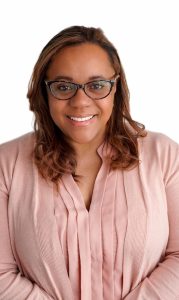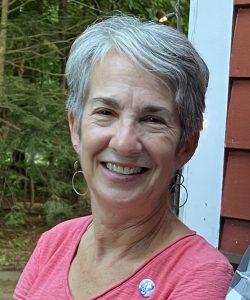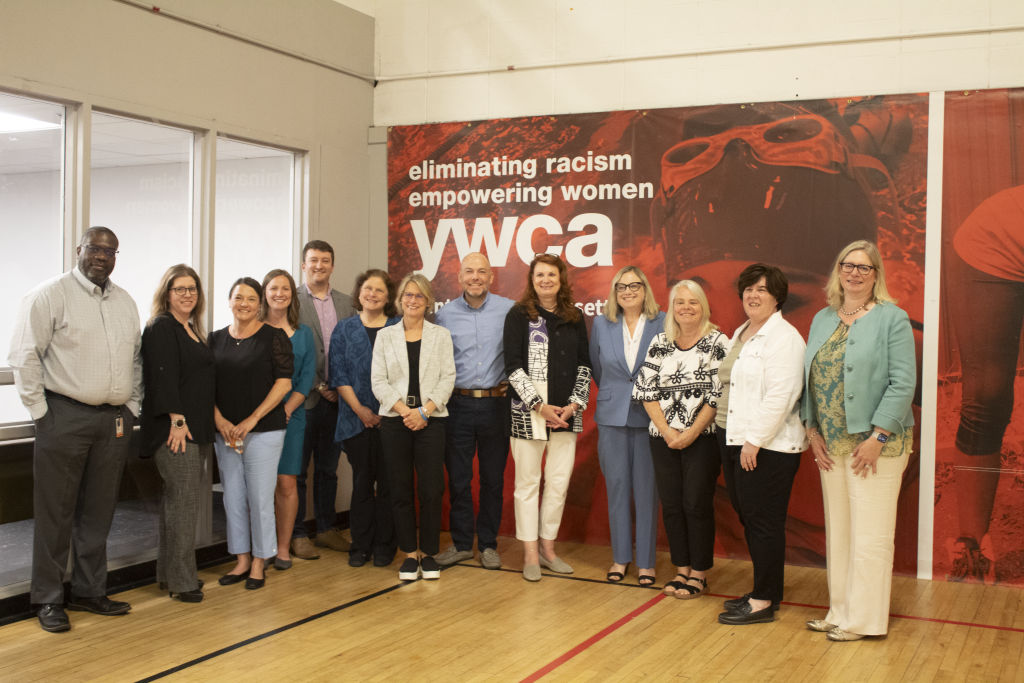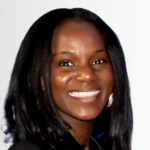Category: Uncategorized
My Y Story- Jen Safford

For Jennifer Safford, the YWCA is more than just an organization. It is a place that has shaped her family, her career, and her community for over 25 years.
Jennifer has lived in Worcester all her life and has built her career in education and youth development. She now works at Clark University. She is a proud parent of three young adults and serves on the YWCA Board of Directors. Her connection to the YWCA started years ago when her nephew joined the early education programs, and it has only grown since then.
Jennifer’s connection to the YWCA has grown in many ways over the years. She has joined the Racial Justice Task Force, taken part in fitness programs, and experienced the YWCA as a parent when her oldest son went to daycare and her daughter attended preschool. Through every stage of her life, the YWCA has been a steady presence and has always felt like home.
These experiences have given Jennifer a strong connection to the YWCA’s childcare programs. She knows firsthand how high-quality early education can help families. She is also proud to support the YWCA’s Domestic Violence programs and its mission to eliminate racism. She believes this work is essential for building stronger, safer, and more just communities.
To Jennifer, generosity means more than just giving money. It is about helping in any way you can, whether through your time, attention, advocacy, or caring for others. Every way of giving matters, and every contribution helps strengthen the YWCA’s work.
Jennifer’s message to anyone thinking about supporting the YWCA is simple: thank you. It takes a community working together to provide the programs, services, safe spaces, and sense of home that the YWCA gives to people across Central Massachusetts. Supporting the YWCA means investing in families, empowering women, and helping to create a future where everyone can thrive.
Jennifer’s story shows what the YWCA stands for: a place where families grow, communities become stronger, and lasting change begins.
Donate Today and share your story with us!
My Y Story – Shelley Rodman
My Y Story – Shelley Rodman
 For longtime YWCA supporter Shelley Rodman, “giving back” is more than just a phrase. It’s a way of life shaped by her values and a strong belief in strengthening communities from within. Originally from Ohio, Shelley built her life and career in nonprofit management before settling in Worcester with her husband, Todd. Over the years, she has learned firsthand that strong communities rely on both public policy and the generosity of others. This is why she gives not only through civic participation but also through personal philanthropy, especially to organizations whose missions reflect her own principles. The YWCA is definitely one of them.
For longtime YWCA supporter Shelley Rodman, “giving back” is more than just a phrase. It’s a way of life shaped by her values and a strong belief in strengthening communities from within. Originally from Ohio, Shelley built her life and career in nonprofit management before settling in Worcester with her husband, Todd. Over the years, she has learned firsthand that strong communities rely on both public policy and the generosity of others. This is why she gives not only through civic participation but also through personal philanthropy, especially to organizations whose missions reflect her own principles. The YWCA is definitely one of them.
Shelley’s introduction to the YWCA came early. Her mother worked for the YWCA of Greater Cleveland, giving her a front-row seat to the breadth and depth of the organization’s work. It planted a seed, a quiet awareness that the YWCA touches lives in more ways than most people realize.
Years later, after moving to Worcester and volunteering with the United Way of Central Massachusetts, Shelley met former Executive Director of the YWCA Central Massachusetts, Linda Cavaioli. That relationship eventually led to an invitation to join the Board of Directors, a turning point that allowed her to see the organization up close. When she joined the board, Shelley was encouraged to serve on committees traditionally dominated by men, like the finance and investment committees. For Shelley, that moment reflected what the YWCA stood for, and she thought, “I’m so happy to say that I always know the YWCA will prepare women for life in every way.”
Of all the programs the organization offers, few stand out to her on a personal level. The first is the YWCA’s transitional housing program, which provides crucial support for women and families facing homelessness or instability. As Shelley describes it, “such an unknown part of what the YWCA offers, so important and so rare.” The second is childcare and early childhood education. She noted, “When I was balancing work and motherhood, I wondered why it had to be so hard. I hoped that it would be different when my daughter was an adult. But it isn’t. Childcare benefits all of us. And kids who have been in childcare are usually much readier for Kindergarten.” Lastly, she deeply values the YWCA’s broad work in domestic violence education, prevention, and intervention. She emphasizes the importance of increasing community awareness while simultaneously supporting survivors through protective shelters and services. For her, this work safeguards not just individuals but the health of the entire community.
“My long-time involvement with the YWCA has deepened my trust in the organization and my commitment to the mission. This trust is what moves her to continue giving—and what inspires her to encourage others to do the same.” Shelley’s message to prospective donors is simple and joyful: “Do it! The YWCA makes our Worcester community stronger.”
This season reminds us of the power of generosity. Shelley’s story is a testament to how sustained support can shape not just an organization, but a whole community. Her journey shows that giving back is not about the size of the gift, but the belief behind it. Now, she invites you to join her.
Donate Today and share your story with us!
YWCA Domestic Violence High Risk Team
YWCA Domestic Violence High Risk Team
In the United States, one in four women aged 18 and older have suffered severe physical violence from an intimate partner. Every month, an average of more than 70 women lose their lives to intimate partner. Every day, victims of domestic violence face the threat of escalating harm—sometimes with fatal consequences. The YWCA’s Domestic Violence High Risk Teams directly address and prevent these tragedies.
The YWCA is committed to reducing violence against women and girls. To learn more about this crucial work, we sat down with Tara Huard, Director of Domestic Violence Services, to paint a clearer image of the YWCA’s Domestic Violence (DV) High Risk Teams.
“Our DV High Risk Teams works to increase safety for victims and hold those who use violence accountable, with the goal of preventing serious harm or homicide.” Research shows that many domestic violence-related homicides are both predictable and preventable.
The team focuses on four core components:
- Early identification of the most dangerous cases through risk assessment
- Enhanced access to supportive services for victims
- Increased monitoring and accountability for offenders
- Coordinated response through a multidisciplinary team approach.
Altogether, these strategies not only save lives but also strengthen community collaboration.
Our DV High Risk Teams improve safety for survivors by ensuring faster, more coordinated responses to high-risk situations. They increase access to vital resources for victims while developing immediate, individualized intervention plans that prioritize survivor safety and offender accountability. “Advocates can connect survivors directly with detectives on the team, which often reduces the stress and confusion that can come with reporting through traditional response systems.” The collaborative nature of working with the DV High Risk Teams can help build a greater sense of trust and safety, allowing them to feel more confident throughout the process.
This kind of coordination did not always exist. Before the team started, agencies often worked separately. As a result, critical information was lost, victims’ needs were left unmet, and offenders walked away without consequence. Since the DV High Risk Teams began, agencies have come together, sharing information and facilitating a more collaborative response procedure. This has ensured that survivors are receiving timely and efficient support.
Huard also serves on a subcommittee of the Governor’s Council for Addressing Domestic and Sexual Violence. They were recently updating the 2017 Domestic Violence Law Enforcement Guidelines when Huard noticed that the definition of strangulation did not align with the federal definition. She brought this issue to the attention of Senator Robyn Kennedy who then presented Bill S.1145, An Act Relative to the Definition of Strangulation. Huard shared that her work as part of the YWCA’s DV High Risk Teams greatly informs her advocacy because it provides her with direct insight into the most dangerous patterns of domestic violence, including strangulation, which is often a predictor of lethality. She said, “This experience underscores how the team’s work can influence policy and systemic change to better protect survivors.”
Huard also noted, “The previous law created ambiguity in how officers, district attorneys, and judges responded to these cases, leaving survivor safety dependent on individual interpretation. By clarifying the law, we aim to ensure that strangulation is treated with the seriousness it deserves, hold offenders appropriately accountable, and provide a stronger legal framework to protect survivors.”
Join the YWCA in supporting survivors by believing them and showing compassion. Avoid judgement or giving simplistic advice like, “Just leave.” It is important to shift the narrative. Focus on holding those who use violence accountable and creating a culture that prioritizes safety, support, and prevention.
Support the Domestic Violence Services at the YWCA by donating through https://ywcacm.org/donate/.
If you or someone you know needs help, reach our 24-hour helpline at 508-755-9030 or our 24-hour chatline at ywcahelp.com.

Anniversary of the Civil Rights Act of 1964
Today marks the anniversary of the Civil Rights Act of 1964, a landmark law that outlawed discrimination based on race, color, religion, sex, or national origin. It was a hard won victory, born out of generations of protest, courage, and sacrifice. However, the very protections established by the Civil Rights Act are currently being gutted, challenged in courts, weakened by legislation, and ignored in practice. This anniversary is not just a moment to reflect; it is a call to action. We owe it to those who came before us, and to those coming after, to defend these rights and keep pushing for justice.
#untiljusticejustis
Juneteenth 2025: Honoring Freedom, Resisting Erasure
As we celebrate Juneteenth, the day in 1865 when news of emancipation finally reached the last enslaved Black Americans, we also face a harsh reality. Across the country, DEI departments are being dismantled. Words like diversity, equity, inclusion, culture, and heritage are being removed from the websites of academia, nonprofits, and public institutions. Books are being banned, monuments removed, and Black history erased. This reflects past efforts to suppress the truth, from post-Reconstruction historical revisionism to Jim Crow censorship. Today, that legacy lives on in quieter, more calculated forms. Juneteenth is more than a celebration of freedom. It is a call to remember, to resist, and to commit. We must protect historical truth, honor the contributions of Black Americans, and speak out against the silencing of our stories. Freedom delayed is freedom denied, and freedom erased is justice undone.
#untiljusticejustis
Statement on the Anniversary of Brown v. Board of Education
Today, we recognize the anniversary of Brown v. Board of Education, the landmark decision that affirmed every child’s right to an equal education. While we have made progress, the pursuit of true equity in our schools continues. Earlier this year, I had the opportunity to participate in Principal for the Day. It was a powerful experience to visit classrooms and see dedicated teachers engaging students in meaningful, inclusive learning. It reminded me how much potential exists in every school when we invest in our educators and students. In Worcester, we must remain committed to ensuring all students—regardless of race, zip code, or background have access to high-quality education. To honor the legacy of Brown, we must: invest equitably in our schools, support and retain diverse educators, promote inclusive, culturally responsive teaching, and expand access to early learning, enrichment, and student support services. Educational equity is not a one-time goal; it is an ongoing responsibility. Let this day be a reminder that the work continues.
Debbie Hall, CEO
YWCA Central Massachusetts
Post Conference Statement
Thank you all for joining Black leaders as we came together in support of our immigrant communities. Your presence and engagement were deeply appreciated and reflect the strength and unity of our shared values. We would like to take a moment to clarify YWCA Central Massachusetts’ position. While we are a proud advocacy organization dedicated to advancing racial and social justice, we are a non-partisan entity. We do not endorse or support any political candidates or parties. Additionally, we want to affirm that we do not support violence as a tool for change. Our mission is rooted in peace, equity, and justice, and we believe meaningful progress must be achieved through nonviolent action, civic engagement, and community collaboration.
Thank you again for your support and commitment to this important work.
PRESS RELEASE: Healey-Driscoll Administration Brings Universal Pre-K Access Road Show to Worcester

FOR IMMEDIATE RELEASE:
May 30, 2025
CONTACT:
Kim N. Le, kim.le@mass.gov , 617-823-4874
Healey-Driscoll Administration Brings Universal Pre-K Access
Road Show to Worcester
WORCESTER — The Massachusetts Department of Early Education and Care (EEC) continued its statewide Universal Pre-K Access Road Show today in Worcester, the third stop on the tour spotlighting the state’s various early childhood education partnerships and ongoing commitment to expanding access to high-quality preschool for all children through the Commonwealth Preschool Partnership Initiative (CPPI). The event brought together families, early educators, local officials, and community partners to discuss and shape the Commonwealth’s vision for universal access to high-quality pre-kindergarten.
During the visit, EEC Commissioner Amy Kershaw joined local leaders and educators at the YWCA Central Massachusetts to visit a CPPI classroom and participate in a round table discussion about the city’s progress in planning and implementation.
“We are grateful to our partners in Worcester for hosting us and sharing their commitment to expanding access to high-quality preschool opportunities in the city,” said EEC Commissioner Amy Kershaw. “We’re excited to see the energy and momentum on display today in Worcester and look forward to continuing our partnership to promote the educational success of the Community’s youngest learners and the economic mobility of their families.”
 Worcester is in the early stages of CPPI implementation, building on the previous planning in partnership with two community-based programs, the Guild of St. Agnes and the Worcester YWCA. In the current phase, the partners are engaged in strategic planning activities with stakeholders throughout the community and piloting work that aligns with CPPI priority areas, including aligned curriculum across classrooms in both the partner organizations and the public school, and conducting Classroom Assessment Scoring System (CLASS) observations to collect data on future professional development needs.
Worcester is in the early stages of CPPI implementation, building on the previous planning in partnership with two community-based programs, the Guild of St. Agnes and the Worcester YWCA. In the current phase, the partners are engaged in strategic planning activities with stakeholders throughout the community and piloting work that aligns with CPPI priority areas, including aligned curriculum across classrooms in both the partner organizations and the public school, and conducting Classroom Assessment Scoring System (CLASS) observations to collect data on future professional development needs.
Participants of the round table discussion shared personal experiences and offered input on how to make early education more accessible, affordable, and inclusive, and educators spoke about the importance of professional support and resources.
“The CPPI grant is truly re-envisioning the early education and care field by providing a high-quality mixed-delivery model, strong foundation for early learning and most importantly supports for families and educators,” said Darlene Belliveau, Director of Children’s Services at the YWCA Central Massachusetts. “The grant has provided coaching and modeling for individualized guidance to help refine practices and serves as a guide for educators to emulate. Our goal is to develop a single point of entry system that is user-friendly for families and develop enhanced data systems.”
“Worcester has a very tight-knit provider community whose members have been working together for years to support our families,” said Sharon MacDonald, President and CEO at the Guild of St. Agnes. “The CPPI funding allows this partnership to grow, allowing us to increase services to children and families, particularly by enabling the Worcester Public Schools to serve children with special needs directly in their early education and care centers. This model allows children whose parents need full-day, full-year care to stay in their child care center, while receiving services from the Worcester Public Schools’ special education department right in their center. The model also frees up more openings in the public-school preschool classrooms, greatly reducing the waitlist for those seats. The Guild is thrilled to be part of this initiative.”
While in Worcester, EEC Commissioner Kershaw also met with leaders from the Worcester Public Schools to talk about the city’s continued commitment to the program, the benefit of local partnerships, and their approach to comprehensive preschool services throughout the community.
These visits are part of the Healey-Driscoll Administration’s broader Gateway to Pre-K initiative, which is investing more than $20 million across Massachusetts to expand access to preschool, especially in Gateway Cities and rural communities. Worcester’s stop follows productive events in Somerville and Northampton, with additional visits planned in the coming months across different regions of the state.
Governor Healey’s FY26 budget and related Fair Share supplemental budget funds CPPI at $25 million for FY26, with additional funding to expand access over 3 years. The expansion would allow CPPI to reach the remaining 7 Gateway Cities not currently funded, as well as enable 12 current grantees move to full implementation. In total, funding would be available for 37 districts to continue efforts to create systemic alignment and coordination, strategic expansion, and efficient investments to make on-the-ground progress towards the goal of universal access to preschool in the Commonwealth.
EEC intends to release opportunities to apply for CPPI grants in FY26 through a staged process subject to the availability of funding. Learn more about CPPI at Mass.gov/CPPI.
###
HERstory: Surviving Financial Abuse

In one of our recent financial literacy workshops, Jessica* bravely shared the severity of the financial abuse she was enduring at the hands of her husband.
Though he worked full-time and earned a substantial income, he refused to provide adequate funds for their household. He even went so far as to lock the refrigerator—stocked with fresh foods only he could access—leaving Jessica and their children to survive on packaged items that didn’t require refrigeration. Nutritious meals were out of reach.
Despite the appearance of financial stability, Jessica was deprived of basic necessities. Because of their marital status and shared household income, she was deemed ineligible for food stamps. Yet she was living in food insecurity.
Recognizing the urgency of her situation, our YWCA Advocate reached out to the Domestic Violence Liaison at the Department of Transitional Assistance (DTA). Together, they were able to secure emergency food stamp benefits for Jessica—while protecting her confidentiality.
That moment was transformative. For the first time in a long while, she could buy fresh fruits and vegetables for her children.
From there, the Advocate helped Jessica build a monthly budget that prioritized nutritious food options. They also created a savings plan, step by step, to help her move out of the marital home and eventually file for divorce. Slowly, a path toward freedom and financial independence began to take shape.
At YWCA, we believe every survivor deserves the chance to reclaim their future.
If you or someone you know is experiencing abuse, we’re here to help. You are not alone. Call our 24-hour helpline at 508-755-9030 or visit our 24-hour chatline at ywcahelp.com.
*Name changed to protect identity.
YWCA USA Delegate at the Commission on the Status of Women

 We are thrilled to congratulate Mariame, a dedicated staff member of the YWCA Central Massachusetts, on her incredible achievement of being named a YWCA USA delegate at the 69th gathering of the Commission on the Status of Women (CSW)!
We are thrilled to congratulate Mariame, a dedicated staff member of the YWCA Central Massachusetts, on her incredible achievement of being named a YWCA USA delegate at the 69th gathering of the Commission on the Status of Women (CSW)!
Mariame has served as a Domestic Violence (DV) Family Shelter Advocate at the YWCA Central Massachusetts since 2017.
Her passion for gender equity is rooted in her upbringing in Guinea, West Africa, where she witnessed systemic inequalities and their disproportionate impact on women and girls. “These experiences shaped who I am today and planted the seeds of my passion for justice and empowerment,” she shares.
What Inspires Mariame About the YWCA Mission
The YWCA’s mission to eliminate racism, empower women, and promote justice and peace resonates deeply with Mariame. “What moves me most is the YWCA’s unwavering commitment to empowerment. Unlike many shelters, where rigid rules can unintentionally replicate patterns of control survivors faced in abusive relationships, the YWCA’s approach centers on trust and respect.”
Mariame elaborates: “We believe survivors know what’s best for their lives. By guiding rather than directing, we create a space where they feel heard, respected, and empowered. Witnessing these moments of transformation—when a survivor begins to rediscover their voice and reclaim their agency—is heartwarming and reminds me why this work matters so much.”
Representing the YWCA at the United Nations
Being chosen as a YWCA USA delegate to the CSW is a personal and professional honor for Mariame. “This opportunity means the world to me,” she reflects.
Moving to the U.S. at 16, Mariame carried with her a dream of contributing to gender equity, particularly in sub-Saharan Africa, where barriers to equality are often greater. “Standing on an international stage, contributing to global conversations about gender equity, feels like a full-circle moment. It’s a reminder of the power of persistence and the critical role organizations like the YWCA play in shaping a more equitable world.”
The Journey to Becoming a Delegate
Mariame describes her journey to being selected as a delegate as both humbling and validating. “When I saw the call for applications in the YWCA USA newsletter, I decided to take a leap of faith and apply. I didn’t think I’d be selected, especially because I haven’t fully aligned my fundraising career with my passion for gender equity. But I also knew that if I didn’t try, I’d never know.”
To her surprise, Mariame was chosen. “It was a profound moment of affirmation—proof that my lived experiences, from growing up in Guinea to working on the frontlines in the U.S., are not limitations but strengths.” Mariame also expresses heartfelt gratitude to Deborah Hall, YWCACM CEO, whose letter of recommendation played a key role in her selection.
Advocacy Focus
At the 69th gathering of the Commission on the Status of Women, Mariame plans to elevate the voices of survivors and highlight the systemic challenges they face.
She will focus on two critical issues:
- Domestic Violence as a Barrier to Gender Equity
“Domestic violence is a significant hindrance to achieving gender equity,” Mariame explains. She will shed light on issues such as housing instability, economic dependence, and the unique challenges immigrant women face, such as navigating complex immigration systems and language barriers.
“The lack of safe, accessible shelters is heartbreaking. As the only DV shelter in Central Massachusetts, we face overwhelming demand. It’s devastating to tell survivors, ‘We don’t have any rooms available.’ This underscores a systemic failure to prioritize their safety.”
- Economic Barriers for Women
Mariame is equally passionate about addressing economic disparities. “It’s shocking that people working full-time, like some of my coworkers, can barely make ends meet due to the high cost of childcare and inadequate wages. Nonprofits like the YWCA, overwhelmingly powered by women, are underfunded, and funders often neglect crucial overhead costs necessary for our work.” Mariame emphasizes that the Beijing Platform for Action already recognizes the link between curbing gender-based violence and reducing poverty to achieve gender equity. “My goal is to ensure these conversations remain rooted in the lived realities of those we serve.”
Congratulations, Mariame, on this well-deserved recognition. We can’t wait to see the impact you’ll make on behalf of the YWCA!

